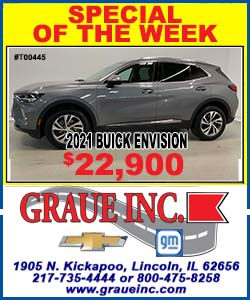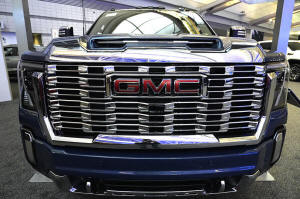Shares of GM and other automakers slump as they face higher costs from
Trump tariffs
[March 28, 2025] By
DAMIAN J. TROISE
NEW YORK (AP) — Shares of major automakers slumped following President
Donald Trump's announcement that he will place 25% tariffs on auto
imports.
Automakers have spread out their supply chains and production facilities
throughout North America. Parts and production steps often cross one or
more borders during the process. That means it will cost the major
automakers more money to build their cars and trucks.
The tariffs will take effect April 3.
“Ultimately, if these tariffs remain in place, we see vehicle prices
going higher to help offset the cost,” said Joseph Spak, analyst at UBS,
in a note to investors.
General Motors slumped 7.4%. The Detroit automaker could be among the
hardest hit of its peers under broad tariffs, as it sources about 40% of
vehicles sold in the U.S. from Mexico and Canada, according to analysts
at JPMorgan.
Ford, which slipped 3.9%, is less exposed with under 10% of vehicles
sourced outside of the U.S., JPMorgan said.
Stellantis, which is based in the Netherlands but has significant
manufacturing operations in North America, fell 1.3%.
Honda shares traded in the U.S. fell 2.2% and Toyota shares traded in
the U.S. fell 2.5%.

One exception was Tesla. The cars it sells in the U.S. are produced
domestically, although CEO Elon Musk noted in a post on X that some car
parts used in Teslas come from other countries. Its shares edged up
0.4%. The stock is still down more than 30% this year due to lagging
sales in its major markets.
Auto parts suppliers also lost ground. Autoliv fell 3.5% and Aptiv
slipped 5.4%. Gentex fell 3.6% and Lear fell 8.3%
[to top of second column] |

This is the grill on a GMC Sierra Heavy Duty Denali HD 2500 truck on
display at the Pittsburgh International Auto Show in Pittsburgh,
Feb. 15, 2024. (AP Photo/Gene J. Puskar, File)
 Consumers are already facing near
record-high car prices. The average price of a new vehicle was
$48,039 as of February, according to Cox Automotive's Kelley Blue
Book. That's not far from the record of just under $50,000 in late
2022.
Other costs related to car ownership have continued to squeeze
consumers. The costs of insuring and repairing a vehicle continued
rising throughout 2024 and into 2025. Such costs have been among
some of the factors keeping overall inflation stubbornly high.
Economists worry that tariffs could further reignite inflation as
consumers grow increasingly worried about high prices and the
economy.
Automakers have been preparing for tariffs since Trump started the
trade war with key trading partners in early February. General
Motors and others have worked to get more inventory into the U.S.
ahead of any tariffs.
“If they become permanent, then there’s a whole bunch of different
things that you have to think about in terms of where do you
allocate plants and do you move plants,” said Paul A. Jacobson,
chief financial officer at General Motors, during a conference in
February.
Trump said the latest round of auto tariffs will be permanent. He
has argued that they will lead to automakers opening more factories
in the U.S.
“As much as the market is pricing in a big impact of tariffs and
lost profitability, think about a world where on top of that, we’re
spending billions of capital, billions of dollars in capital, and
then it ends, right,” Jacobson said. “So we can’t be whipsawing the
business back and forth.”
All contents © copyright 2025 Associated Press. All rights reserved |